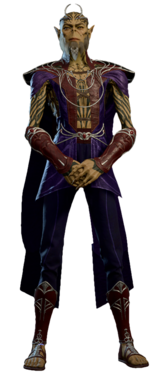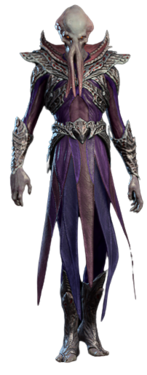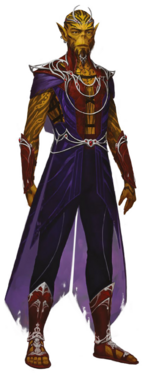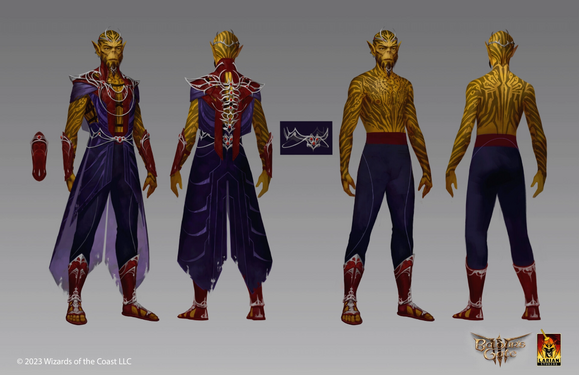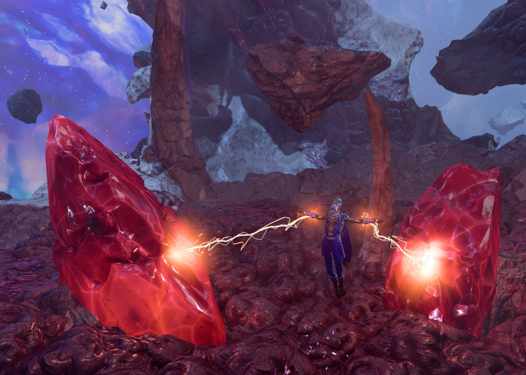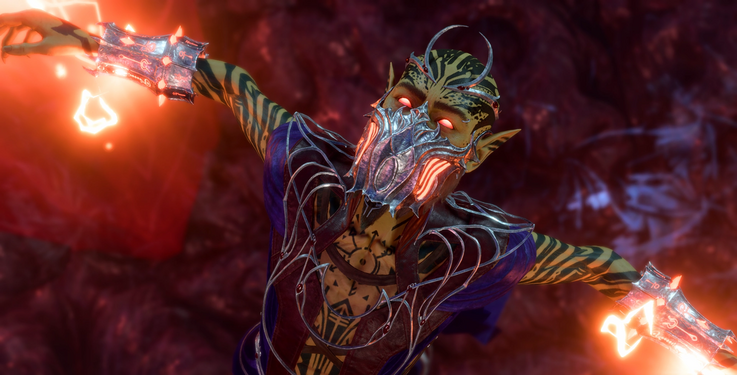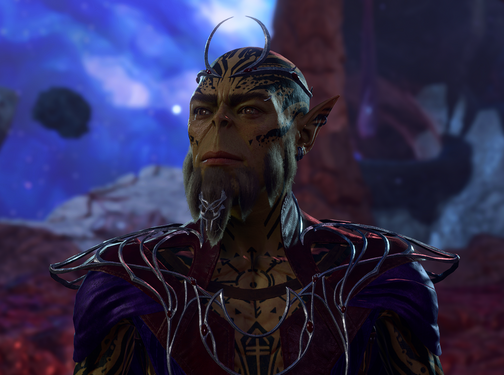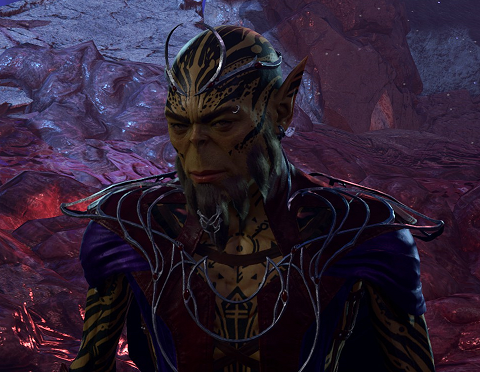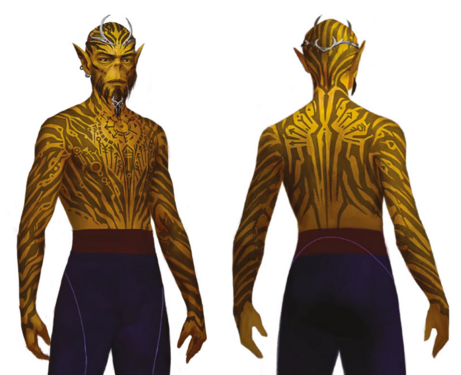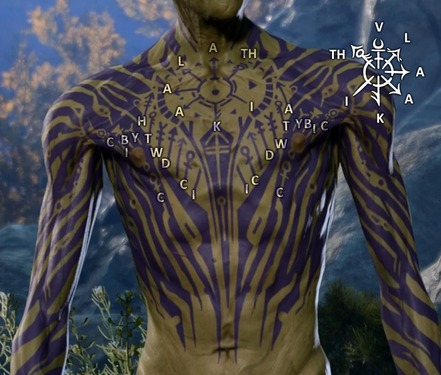Ad placeholder
Orpheus: Difference between revisions
HiddenDragon (talk | contribs) (Navbox and categories) |
No edit summary |
||
| (39 intermediate revisions by 6 users not shown) | |||
| Line 1: | Line 1: | ||
{{PageSeo | {{PageSeo | ||
| title = Orpheus | | title = Orpheus | ||
| description = Orpheus is | | description = Orpheus is an important Githyanki leader in Baldur's Gate. | ||
| image = Orpheus_Freed.webp | | image = Orpheus_Freed.webp | ||
}} | }} | ||
{{Infobox | {{CombatTab}} | ||
{{Infobox creature | |||
| name = Orpheus | | name = Orpheus | ||
| image = Orpheus_Freed.webp | | va = Tommy Sim'aan | ||
| title = The Prince of the Comet | |||
| role = [[Attached Follower]] | |||
| image = <gallery> | |||
Orpheus_Freed.webp|In-game | |||
Orpheus Model.png|Model | |||
Portrait Orpheus.png|Portrait | |||
</gallery> | |||
| identity = Male | |||
| hometown = [[Astral Plane]] | |||
| race = [[Githyanki]] | | race = [[Githyanki]] | ||
| | | family = {{FRWiki|Gith}} (mother) | ||
| | | size = [[Medium]] | ||
| | | type = [[Humanoid]] | ||
| | }} | ||
'''Orpheus''', is a [[Githyanki]] that appears in [[Baldur's Gate 3|''Baldur's Gate 3'']], playing a major role in [[Act Three]] and {{CharLink|Lae'zel}}'s personal quest, {{Quest|The Githyanki Warrior}}. As the son of Gith herself, he acts as the supposed true ruler of the Gith Empire. However, he has been captured and is imprisoned in the [[Astral Plane]]. Being a githyanki, he seeks to destroy the [[mind flayers]] and remove {{CharLink|Vlaakith}} from power. | |||
{{DiQ|Quickly now - even here, we do not have infinite time.|Orpheus| after being freed from his prison.}} | |||
== Overview == | |||
=== Background === | |||
According to the inscribed discs, banned and deemed heretical by followers of Vlaakith, Orpheus is the first (and only) son of Mother Gith, the leader of the rebellion that freed the race that would bear her name from the Illithid Empire. Gith's impressive psionic powers allowed her to disrupt elder brain control, powers that her son inherited. At some point during the rebellion, Gith's advisor Vlaakith made a deal with the dragon goddess {{FRWiki|Tiamat}}, in which the gith acquired their red dragons. It was only after the split between the githyanki and [[githzerai]] that the cost of Vlaakith's deal was revealed, as Gith was summoned to the [[Nine Hells]] to become Tiamat's advisor. Tiamat's red dragon consort {{FRWiki|Ephelomon}} came to the githyanki, and decreed that Vlaakith was to be their new ruler. | |||
Outraged at this turn of events, Orpheus led a rebellion against Vlaakith I's rule, assembling an Honor Guard and declaring himself the rightful ruler of the githyanki. This "War of the Comet" was said to have ended with Orpheus' death at the hands of {{CharLink|Kith'rak Voss}} and with Ephelomon devouring his corpse<ref>{{SmRarityItem|Orpheus, Prince of the Comet, Part Three: Resurrection}}</ref>. In truth, Orpheus and his Honor Guard were sealed away in a corner of the [[Astral Plane]], accessed using the [[Mysterious Artefact|Astral Prism]]. Orpheus himself was restrained by Infernal chains, so that Vlaakith could exploit his elder brain disruption powers. The fact that Orpheus still lived was known only to Voss, the current and past Vlaakiths, and the few secret devotees of the Prince of the Comet spread throughout githyanki society. | |||
| | The artifact containing Orpheus soon came to the attention of {{CharLink|The Netherbrain}}, who wanted to use it to overthrow the Chosen of the [[Dead Three]] in control of it. It sent a team of illithids to find and take the artifact from the githyanki. However, the leader of the group (a mind flayer known as {{CharLink|The Emperor|the Emperor}}) seized the opportunity and went rogue, taking the artifact and hoping to use it to overthrow the elder brain. | ||
{{ | == Involvement == | ||
| | |||
| | |||
=== Act One & Act Two === | |||
Orpheus and his role in the greater story of ''Baldur's Gate 3'' is hinted throughout the game, but is not truly revealed until the beginning of [[Act Three]] References to him are found throughout the game, notably in the "Orpheus, Prince of the Comet" series of discs, which recount his attempted rebellion against the first Vlaakith and form the backbone of the quest {{Quest|Discover the History of Prince Orpheus}}. | |||
=== Act Three === | |||
{{Main|Free Orpheus}} | |||
==== Battle in the Astral Prism ==== | |||
{{Main|Help Your Protector}} | |||
| | |||
| | |||
' | While resting at [[Wyrm's Lookout]], the party are ambushed by githyanki warriors and combat ensues. The [[Dream Guardian]] opens a portal into the Astral Prism for the party to enter, lest they fall under the [[Absolute]]'s influence. There, the Dream Guardian reveals their true form as a mind flayer free from hivemind control, and asks the party for their aid against the githyanki. Though the party has the option to attack their protector, this will lead to a [[Game Over screens|Game Over]], as the player character and all party members either fall under the control of the Absolute, or are killed by the githyanki. After the battle, the Dream Guardian reveals that the source of the party's protection has been an imprisoned Orpheus, and that the githyanki who attacked are his Honor Guard, who were imprisoned alongside him by the first Vlaakith. Completing this encounter will complete both {{Quest|Discover the History of Prince Orpheus}} and {{Quest|Discover the Artefact's Secrets}}, as well as start {{Quest|Free Orpheus}}. | ||
== | ==== Acquiring the Orphic Hammer ==== | ||
{{Main|Deal with the Devil|Escape the Deal}} | |||
After his visit to the party's camp in [[Act Two]], Kith'rak Voss will have directed the party to meet him at [[Sharess' Caress]] in [[Wyrm's Crossing]]. [[Baldur's Gate]]. Upstairs, in the [[Devil's Den]], the party will find him attempting to make a deal with the devil {{CharLink|Raphael}}, who eventually dismisses him. Talking to the devil reveals he has the {{SmRarityItem|Orphic Hammer}}, a magically imbued hammer with the ability to free Orpheus from his infernal chains. He promises to give the artifact to the party in exchange for the {{IconLink|size=20|Crown of Karsus Faded.png|Crown of Karsus}}, signing a {{SmRarityItem|Soul-Sworn Contract|override_icon=Soul-Sworn Contract.png}} with the player character if they accept. The player character has serveral options to act: | |||
# The player character refuses the deal but decides to acquire the Orphic Hammer anyways. The party must infiltrate the [[House of Hope]] to steal the Orphic Hammer. This leads to a fight against Raphael. | |||
# The player character accepts the deal and doesn't betray Raphael. At the final battle, after freeing Orpheus, Raphael will appear and give them the Orphic Hammer. As his deal involves handing over the Crown of Karsus, this prevents {{CharLink|Gale}} from either giving the crown to {{CharLink|Mystra}} or using it to become a god, and causes Raphael to appear at the celebration in the [[Epilogue]]. | |||
# The player character accepts the deal (signing a {{SmRarityItem|Soul-Sworn Contract|override_icon=Soul-Sworn Contract.png}} with the devil) but ultimately decide to break it. Then it is necessary to infiltrate the House of Hope and acquire the contract. The Orphic Hammer can also be stolen. This leads to a fight against Raphael. | |||
Showing the Orphic Hammer to Voss will complete {{Quest|Help Kith'rak Voss}}, which grants you the {{SmRarityItem|Silver Sword of the Astral Plane}} | |||
==== Deciding the Prince's Fate ==== | |||
At the [[Morphic Pool]], the player character attempts to wield the Netherstones and control the Netherbrain, but is overwhelmed. The Emperor brings the party into the Astral Prism, and tells them that only an illithid can successfully wield the Netherstones. Here Orpheus' fate can be decided, with most decisions depending on whether or not the party acquired the Orphic Hammer. | |||
===== The Prince Assimilated ===== | |||
Orpheus can be "assimilated" by either the Emperor, a mind flayer player character, or a mind flayer {{CharLink|Karlach}}. If Lae'zel has rejected Vlaakith and embraced Orpheus, the player character must pass a {{Ability check|Persuasion|30}} or she will turn hostile. Upon leaving the Astral Prism and reaching [[The High Hall|High Hall]], an enraged Voss will turn hostile unless convinced not to, which requires a {{Ability check|Persuasion, Deception|30}}, with an additional prerequisite {{Ability check|Persuasion, Intimidation|25}} if the player character was the one to "assimilate" Orpheus. If Voss turns hostile, he can no longer be recruited as part of {{Quest|Gather Your Allies}} | |||
== | ===== The Prince Freed ===== | ||
=== | The party can refuse to allow the Emperor to "assimilate" Orpheus. Alternatively, a mind flayer player character can refuse to "assimilate" Orpheus, though a check is required to prevent your hunger from getting the best of you. Either choice causes the Emperor to defect to the Netherbrain, and the party then can free Orpheus. If the player character made the deal with Raphael and didn't betray him, then he will show up and give the Orphic Hammer to the party. | ||
Orpheus | |||
If not having optained the Orphic Hammer at this point, then Raphael will appear and make his offer again. Refusing the offer causes a Game Over, so the player character is forced to {{Quest|Fulfill the Deal}}. | |||
Regardless, Orpheus is freed and offers an alliance to the party, though he may scold them for not freeing him sooner, or for stealing the {{SmRarityItem|Githyanki Egg}}. Like the Emperor, he tells the party that the only way to wield the Netherstones is to become an illithid. There are several options at this point: | |||
# The player character or another party member becomes a mind flayer. Orpheus lowers his psionic defenses to allow the order to transform to go through. | |||
# If the player character and any other party members refuse to become a mind flayer, Orpheus offers to make the sacrifice instead. Lae'zel is dismayed but will not turn hostile. | |||
# The player character and the party decide to fight Orpheus. Winning or losing this battle immediately results in a Game Over, as the party either dies or loses Orpheus' protection and becomes dominated by the Absolute. | |||
Regardless of who transforms, Orpheus will join the party as an [[Attached Follower]] for the final battle. Depending on who transformed, Voss will express either confusion or dismay, but will also not turn hostile. | |||
== | === '''Endings''' === | ||
{{Content warning|section|described|selfharm}} | |||
Orpheus' role in the ending will depend on whether or not he transformed into a mind flayer | |||
If Orpheus turned into a mind flayer, he will appear on the docks and ask Lae'zel to lead the githyanki fight for freedom without him, as he is now an abomination and seeks death. He will ask another party member (usually the player character or Lae'zel) to kill him. If his request is not fullfilled, he will kill himself unless the player character convinces him refrain with a {{Ability check|Persuasion|20}}. If passing the check, he will leave the docks for places unknown. | |||
If the player character or another party member turned into a Mind Flayer, he will appear on the docks, thanking the party's ceremorph for their sacrifice. Beeing now ready to begin a new rebellion against Vlaakith's tyranny, he calls two red dragons, and invites Lae'zel to join him in his new war against the Lich Queen. Lae'zel can either join Orpheus, be convinced to stay in [[Faerûn]], which requires a {{Ability check|Persuasion|30}}, and will automatically be rejected if the player character became a Mind Flayer, or take the player character along with them, if the player character is [[Lae'zel/Romance|romancing]] Lae'zel. Regardless of what choice Lae'zel makes, Orpheus flies on his red dragon into the sky and away from Baldur's Gate. | |||
{{ | |||
| | |||
=== Epilogue === | |||
| | {{Content warning|section|mentioned|selfharm}} | ||
| | If Orpheus did not transform into a Mind Flayer, then the player character will find a letter from him in the {{SmRarityItem|Chest of Grateful Words}}, titled {{SmRarityItem|The First Protocol}}. In it, he praises the player character as ''Mla'ghir'' ([[Githyanki vocabulary|Gith]] for "liberator"), and tells them of the success of his ongoing rebellion against Vlaakith. | ||
If Orpheus transformed into a mind flayer but was convinced not to kill himself, then a unique dialogue option asking about him will be present when talking to Lae'zel. Her response indicates that Orpheus has disappeared and gone into hiding, but that she holds out hope he might re-emerge one day. | |||
== Combat == | |||
{{ | {{Main|Orpheus/Combat}} | ||
==Loot== | ===Loot=== | ||
* {{MdRarityItem|Orphic Ring}} | * {{MdRarityItem|Orphic Ring}} | ||
* | * {{MdRarityItem|Potion of Superior Healing}} -2x | ||
== | == Related quests == | ||
* {{Quest|Discover the History of Prince Orpheus}} | |||
* {{Quest|Discover the Artefact's Secrets}} | |||
* {{Quest|Free Orpheus}} | |||
* {{Quest|The Githyanki Warrior}} | |||
== Related literature == | == Related literature == | ||
* {{MdRarityItem|Orpheus, Prince of the Comet, Part One: Betrayal}} | |||
* {{MdRarityItem|Orpheus, Prince of the Comet, Part Two: Sacrifice}} | |||
* {{MdRarityItem|Orpheus, Prince of the Comet, Part Three: Resurrection}} | |||
* {{MdRarityItem|Report for Raphael}} | |||
* {{MdRarityItem|The First Protocol}} | |||
== | ==Gallery== | ||
<gallery heights="250px"> | |||
Orpheus Model.png|Orpheus' model | |||
Player Mind Flayer Model.png|Orpheus' illithid model | |||
Orpheus Concept Art.png|Concept art | |||
Orpheus_Concept_Art_Varenev_A.webp|Concept art | |||
Orpheus Chained.png|Orpheus chained in the Astral Prism | |||
Chained.webp|Orpheus chained in the Astral Prism | |||
Orpheus_Reason.webp|"''It seems we must be allies''" | |||
Orpheus.png|Orpheus talking | |||
Oprheus_Tattoo.png|Orpheus' Tattoo in tir'su | |||
Orpheus Tattoo.webp|Tattoo in-game, datamined by [https://twitter.com/chubblot/status/1677410267024564224 Chubblot] | |||
</gallery> | |||
==Notes== | ==Notes== | ||
| Line 219: | Line 129: | ||
** Mostly nonsense and a mirrored word for Vlaakith - misspelled as "Alaakith". It was probably written as a defiance to her ways. | ** Mostly nonsense and a mirrored word for Vlaakith - misspelled as "Alaakith". It was probably written as a defiance to her ways. | ||
** [[Githyanki]] and [[Githzerai]] use the same writing system but githyanki write clockwise while githzerai - counter-clockwise, though unlike Orpheus, the githzerai do not mirror the symbols. | ** [[Githyanki]] and [[Githzerai]] use the same writing system but githyanki write clockwise while githzerai - counter-clockwise, though unlike Orpheus, the githzerai do not mirror the symbols. | ||
* Orpheus is also the name of a [[wikipedia:Orpheus|demigod]] in Greek mythology who traveled with Jason and the Argonauts in pursuit of the Golden Fleece, but was primarily famous for his journey to the Underworld to save his love Eurydice. | * Orpheus is also the name of a [[wikipedia:Orpheus|demigod]] in Greek mythology who traveled with Jason and the Argonauts in pursuit of the Golden Fleece, but was primarily famous for his journey to the Underworld to save his love Eurydice.{{noteend}} | ||
{{noteend}} | |||
== External links == | == External links == | ||
| Line 233: | Line 142: | ||
[[Category:Characters in the Upper City]] | [[Category:Characters in the Upper City]] | ||
[[Category:Characters in Act Three]] | [[Category:Characters in Act Three]] | ||
[[Category: | [[Category:Attached Followers]] | ||
[[Category:Authors]] | |||
Latest revision as of 19:06, 22 November 2024
| Overview | Combat |
Orpheus, is a Githyanki that appears in Baldur's Gate 3, playing a major role in Act Three and Lae'zel's personal quest, . As the son of Gith herself, he acts as the supposed true ruler of the Gith Empire. However, he has been captured and is imprisoned in the Astral Plane. Being a githyanki, he seeks to destroy the mind flayers and remove Vlaakith from power.

“Quickly now - even here, we do not have infinite time.„
Overview[edit | edit source]
Background[edit | edit source]
According to the inscribed discs, banned and deemed heretical by followers of Vlaakith, Orpheus is the first (and only) son of Mother Gith, the leader of the rebellion that freed the race that would bear her name from the Illithid Empire. Gith's impressive psionic powers allowed her to disrupt elder brain control, powers that her son inherited. At some point during the rebellion, Gith's advisor Vlaakith made a deal with the dragon goddess ![]() Tiamat, in which the gith acquired their red dragons. It was only after the split between the githyanki and githzerai that the cost of Vlaakith's deal was revealed, as Gith was summoned to the Nine Hells to become Tiamat's advisor. Tiamat's red dragon consort
Tiamat, in which the gith acquired their red dragons. It was only after the split between the githyanki and githzerai that the cost of Vlaakith's deal was revealed, as Gith was summoned to the Nine Hells to become Tiamat's advisor. Tiamat's red dragon consort ![]() Ephelomon came to the githyanki, and decreed that Vlaakith was to be their new ruler.
Ephelomon came to the githyanki, and decreed that Vlaakith was to be their new ruler.
Outraged at this turn of events, Orpheus led a rebellion against Vlaakith I's rule, assembling an Honor Guard and declaring himself the rightful ruler of the githyanki. This "War of the Comet" was said to have ended with Orpheus' death at the hands of Kith'rak Voss and with Ephelomon devouring his corpse[1]. In truth, Orpheus and his Honor Guard were sealed away in a corner of the Astral Plane, accessed using the Astral Prism. Orpheus himself was restrained by Infernal chains, so that Vlaakith could exploit his elder brain disruption powers. The fact that Orpheus still lived was known only to Voss, the current and past Vlaakiths, and the few secret devotees of the Prince of the Comet spread throughout githyanki society.
The artifact containing Orpheus soon came to the attention of The Netherbrain, who wanted to use it to overthrow the Chosen of the Dead Three in control of it. It sent a team of illithids to find and take the artifact from the githyanki. However, the leader of the group (a mind flayer known as the Emperor) seized the opportunity and went rogue, taking the artifact and hoping to use it to overthrow the elder brain.
Involvement[edit | edit source]
Act One & Act Two[edit | edit source]
Orpheus and his role in the greater story of Baldur's Gate 3 is hinted throughout the game, but is not truly revealed until the beginning of Act Three References to him are found throughout the game, notably in the "Orpheus, Prince of the Comet" series of discs, which recount his attempted rebellion against the first Vlaakith and form the backbone of the quest .
Act Three[edit | edit source]
Battle in the Astral Prism[edit | edit source]
While resting at Wyrm's Lookout, the party are ambushed by githyanki warriors and combat ensues. The Dream Guardian opens a portal into the Astral Prism for the party to enter, lest they fall under the Absolute's influence. There, the Dream Guardian reveals their true form as a mind flayer free from hivemind control, and asks the party for their aid against the githyanki. Though the party has the option to attack their protector, this will lead to a Game Over, as the player character and all party members either fall under the control of the Absolute, or are killed by the githyanki. After the battle, the Dream Guardian reveals that the source of the party's protection has been an imprisoned Orpheus, and that the githyanki who attacked are his Honor Guard, who were imprisoned alongside him by the first Vlaakith. Completing this encounter will complete both and , as well as start .
Acquiring the Orphic Hammer[edit | edit source]
After his visit to the party's camp in Act Two, Kith'rak Voss will have directed the party to meet him at Sharess' Caress in Wyrm's Crossing. Baldur's Gate. Upstairs, in the Devil's Den, the party will find him attempting to make a deal with the devil Raphael, who eventually dismisses him. Talking to the devil reveals he has the ![]() Orphic Hammer, a magically imbued hammer with the ability to free Orpheus from his infernal chains. He promises to give the artifact to the party in exchange for the , signing a
Orphic Hammer, a magically imbued hammer with the ability to free Orpheus from his infernal chains. He promises to give the artifact to the party in exchange for the , signing a ![]() Soul-Sworn Contract with the player character if they accept. The player character has serveral options to act:
Soul-Sworn Contract with the player character if they accept. The player character has serveral options to act:
- The player character refuses the deal but decides to acquire the Orphic Hammer anyways. The party must infiltrate the House of Hope to steal the Orphic Hammer. This leads to a fight against Raphael.
- The player character accepts the deal and doesn't betray Raphael. At the final battle, after freeing Orpheus, Raphael will appear and give them the Orphic Hammer. As his deal involves handing over the Crown of Karsus, this prevents Gale from either giving the crown to Mystra or using it to become a god, and causes Raphael to appear at the celebration in the Epilogue.
- The player character accepts the deal (signing a
 Soul-Sworn Contract with the devil) but ultimately decide to break it. Then it is necessary to infiltrate the House of Hope and acquire the contract. The Orphic Hammer can also be stolen. This leads to a fight against Raphael.
Soul-Sworn Contract with the devil) but ultimately decide to break it. Then it is necessary to infiltrate the House of Hope and acquire the contract. The Orphic Hammer can also be stolen. This leads to a fight against Raphael.
Showing the Orphic Hammer to Voss will complete , which grants you the ![]() Silver Sword of the Astral Plane
Silver Sword of the Astral Plane
Deciding the Prince's Fate[edit | edit source]
At the Morphic Pool, the player character attempts to wield the Netherstones and control the Netherbrain, but is overwhelmed. The Emperor brings the party into the Astral Prism, and tells them that only an illithid can successfully wield the Netherstones. Here Orpheus' fate can be decided, with most decisions depending on whether or not the party acquired the Orphic Hammer.
The Prince Assimilated[edit | edit source]
Orpheus can be "assimilated" by either the Emperor, a mind flayer player character, or a mind flayer Karlach. If Lae'zel has rejected Vlaakith and embraced Orpheus, the player character must pass a ![]() DC 30 Persuasion check or she will turn hostile. Upon leaving the Astral Prism and reaching High Hall, an enraged Voss will turn hostile unless convinced not to, which requires a
DC 30 Persuasion check or she will turn hostile. Upon leaving the Astral Prism and reaching High Hall, an enraged Voss will turn hostile unless convinced not to, which requires a ![]() DC 30 Persuasion, or Deception check, with an additional prerequisite
DC 30 Persuasion, or Deception check, with an additional prerequisite ![]() DC 25 Persuasion, or Intimidation check if the player character was the one to "assimilate" Orpheus. If Voss turns hostile, he can no longer be recruited as part of
DC 25 Persuasion, or Intimidation check if the player character was the one to "assimilate" Orpheus. If Voss turns hostile, he can no longer be recruited as part of
The Prince Freed[edit | edit source]
The party can refuse to allow the Emperor to "assimilate" Orpheus. Alternatively, a mind flayer player character can refuse to "assimilate" Orpheus, though a check is required to prevent your hunger from getting the best of you. Either choice causes the Emperor to defect to the Netherbrain, and the party then can free Orpheus. If the player character made the deal with Raphael and didn't betray him, then he will show up and give the Orphic Hammer to the party.
If not having optained the Orphic Hammer at this point, then Raphael will appear and make his offer again. Refusing the offer causes a Game Over, so the player character is forced to .
Regardless, Orpheus is freed and offers an alliance to the party, though he may scold them for not freeing him sooner, or for stealing the ![]() Githyanki Egg. Like the Emperor, he tells the party that the only way to wield the Netherstones is to become an illithid. There are several options at this point:
Githyanki Egg. Like the Emperor, he tells the party that the only way to wield the Netherstones is to become an illithid. There are several options at this point:
- The player character or another party member becomes a mind flayer. Orpheus lowers his psionic defenses to allow the order to transform to go through.
- If the player character and any other party members refuse to become a mind flayer, Orpheus offers to make the sacrifice instead. Lae'zel is dismayed but will not turn hostile.
- The player character and the party decide to fight Orpheus. Winning or losing this battle immediately results in a Game Over, as the party either dies or loses Orpheus' protection and becomes dominated by the Absolute.
Regardless of who transforms, Orpheus will join the party as an Attached Follower for the final battle. Depending on who transformed, Voss will express either confusion or dismay, but will also not turn hostile.
Endings[edit | edit source]
This section contains sensitive content, including brief descriptions of self-harm and suicide. |
Orpheus' role in the ending will depend on whether or not he transformed into a mind flayer
If Orpheus turned into a mind flayer, he will appear on the docks and ask Lae'zel to lead the githyanki fight for freedom without him, as he is now an abomination and seeks death. He will ask another party member (usually the player character or Lae'zel) to kill him. If his request is not fullfilled, he will kill himself unless the player character convinces him refrain with a ![]() DC 20 Persuasion check. If passing the check, he will leave the docks for places unknown.
DC 20 Persuasion check. If passing the check, he will leave the docks for places unknown.
If the player character or another party member turned into a Mind Flayer, he will appear on the docks, thanking the party's ceremorph for their sacrifice. Beeing now ready to begin a new rebellion against Vlaakith's tyranny, he calls two red dragons, and invites Lae'zel to join him in his new war against the Lich Queen. Lae'zel can either join Orpheus, be convinced to stay in Faerûn, which requires a ![]() DC 30 Persuasion check, and will automatically be rejected if the player character became a Mind Flayer, or take the player character along with them, if the player character is romancing Lae'zel. Regardless of what choice Lae'zel makes, Orpheus flies on his red dragon into the sky and away from Baldur's Gate.
DC 30 Persuasion check, and will automatically be rejected if the player character became a Mind Flayer, or take the player character along with them, if the player character is romancing Lae'zel. Regardless of what choice Lae'zel makes, Orpheus flies on his red dragon into the sky and away from Baldur's Gate.
Epilogue[edit | edit source]
This section contains sensitive content, including mentions of or allusions to self-harm and suicide. |
If Orpheus did not transform into a Mind Flayer, then the player character will find a letter from him in the ![]() Chest of Grateful Words, titled
Chest of Grateful Words, titled ![]() The First Protocol. In it, he praises the player character as Mla'ghir (Gith for "liberator"), and tells them of the success of his ongoing rebellion against Vlaakith.
The First Protocol. In it, he praises the player character as Mla'ghir (Gith for "liberator"), and tells them of the success of his ongoing rebellion against Vlaakith.
If Orpheus transformed into a mind flayer but was convinced not to kill himself, then a unique dialogue option asking about him will be present when talking to Lae'zel. Her response indicates that Orpheus has disappeared and gone into hiding, but that she holds out hope he might re-emerge one day.
Combat[edit | edit source]
Loot[edit | edit source]
Related quests[edit | edit source]
Related literature[edit | edit source]
 Orpheus, Prince of the Comet, Part One: Betrayal
Orpheus, Prince of the Comet, Part One: Betrayal Orpheus, Prince of the Comet, Part Two: Sacrifice
Orpheus, Prince of the Comet, Part Two: Sacrifice Orpheus, Prince of the Comet, Part Three: Resurrection
Orpheus, Prince of the Comet, Part Three: Resurrection Report for Raphael
Report for Raphael The First Protocol
The First Protocol
Gallery[edit | edit source]
Tattoo in-game, datamined by Chubblot
Notes[edit | edit source]
- His tattoos have writing in tir'su - the gith writing system, see Gallery above.
- Mostly nonsense and a mirrored word for Vlaakith - misspelled as "Alaakith". It was probably written as a defiance to her ways.
- Githyanki and Githzerai use the same writing system but githyanki write clockwise while githzerai - counter-clockwise, though unlike Orpheus, the githzerai do not mirror the symbols.
- Orpheus is also the name of a demigod in Greek mythology who traveled with Jason and the Argonauts in pursuit of the Golden Fleece, but was primarily famous for his journey to the Underworld to save his love Eurydice.
External links[edit | edit source]
![]() Orpheus on the Forgotten Realms Wiki
Orpheus on the Forgotten Realms Wiki
